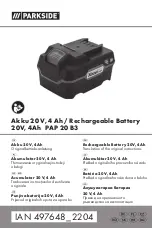
Operation Manual / TPS44-F.. - TPS61-F..
11 Disposing of turbocharger components /
© Copyright 2020 . All rights reserved.
HZTL2412_EN
Rev.G
March 2020
11 Disposing of turbocharger
components
WARNING
Handling damaged thermal insulation
Damaged thermal insulation can lead to dust exposure. The glass fibres
can cause mechanical irritation of the eyes, skin, and respiratory tracts.
u
Avoid the formation of dust.
u
Vacuum up dust with a suitable vacuum cleaner.
u
Wear a respiratory mask to protect against dusts (P1 or P2 mask).
u
Wear safety gloves.
Wear safety goggles.
Wear a respiratory mask to protect against dusts.
Wear safety gloves to protect against mechanical hazards.
Disposal must be environmentally compatible, professional, and in com-
pliance with locally applicable regulations.
The turbocharger consists largely of metal (cast iron materials, steel,
nickel-steel alloys, aluminium and bearing brass).
Further components are: Non-metallic materials (filter components of
felt and polyethylene), lubricants (engine oil), electronic parts (speed
sensor and associated components), and thermal insulation.
u
Dispose of metals as scrap metal for recycling.
u
Dispose of non-metallic materials as waste.
u
Dispose of residues of lubricants as waste oil.
u
Dispose of electronic components as electronic waste.
u
Dispose of thermal insulation as hazardous waste.
Page
108
/
113







































